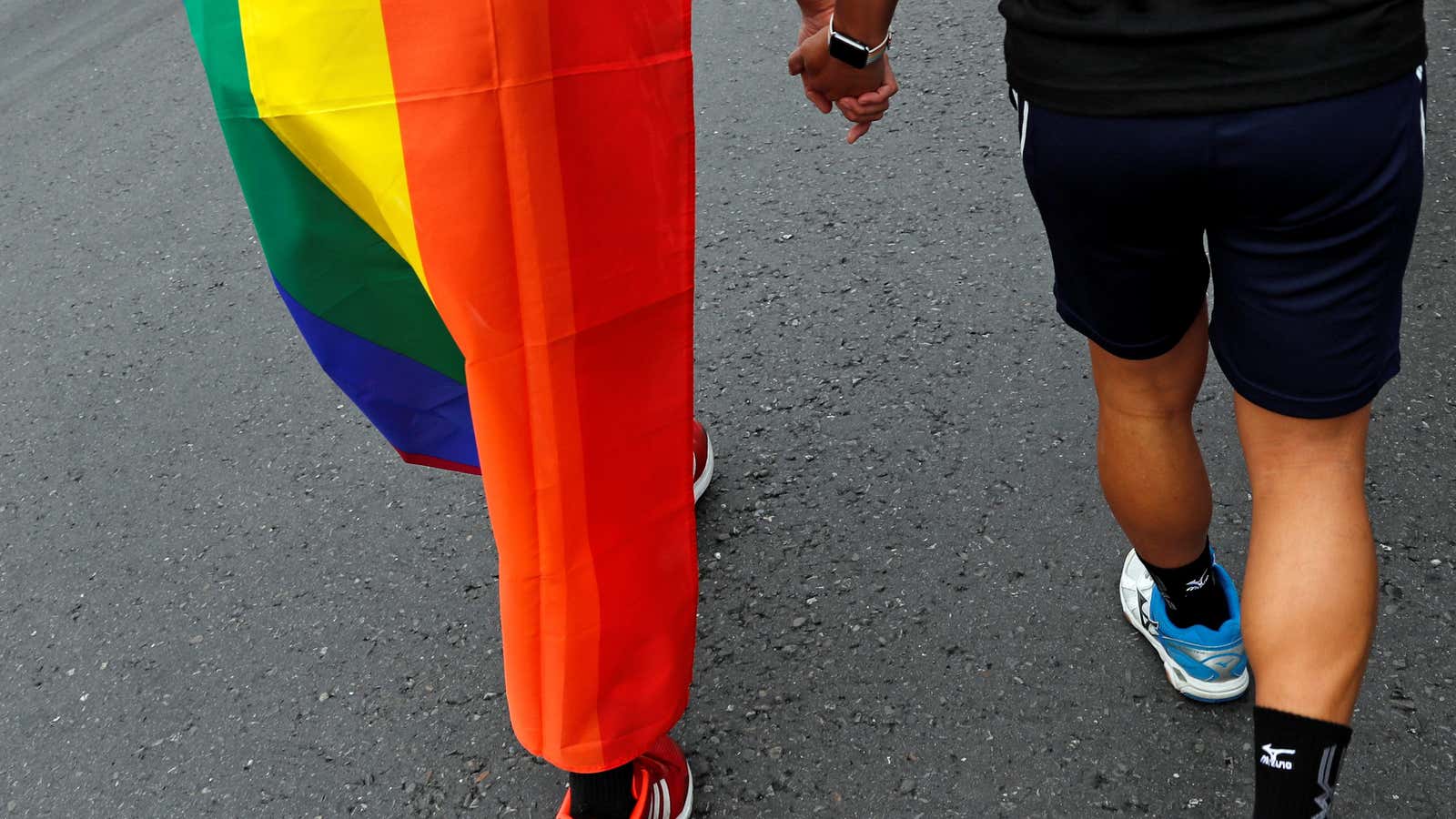Taiwan made history last week by becoming the first place in Asia to legalize same-sex marriage. Activists, however, say the fight is not yet over.
When same-sex couples will be officially allowed to register for marriage starting tomorrow (May 24), M.P. Tang, a 37-year-old Singaporean woman and her Taiwanese partner, for example, will not be among those doing so.
Under Taiwanese law, same-sex couples where one of the parties is foreign can only register to be married in Taiwan if the person is from a jurisdiction where marriage equality exists. For example, a Taiwanese national and his or her same-sex partner can be married in Taiwan if the person is from the US or Australia, where same-sex marriage is legal. If the foreign partner is from Hong Kong or South Korea, for example, where it is not legal, the couple cannot be married in Taiwan.
Currently 26 jurisdictions in the world allow same-sex marriage. Singapore is not one of them.
Countries like New Zealand where same-sex marriage is legal, for example, do not place restrictions on foreigners getting married there. However, under Taiwanese law, marriage and other civil matters such as divorce and domestic relations in general are governed according to the national law of both parties. That also means that same-sex couples from elsewhere in Asia hoping to get hitched somewhere closer to home will not be able to do so.
Taiwan’s legislature passed its same-sex-marriage law following over two years of political wrangling—including a referendum in November that went in favor of conservative campaigners against marriage equality, dealing a major blow to the LGBTQ camp. In that vote, a majority agreed that marriage should be restricted to being between a man and a woman. Some believe that that referendum result, together with political inertia over fears that legalizing same-sex marriage could result in electoral blowback for the current government, resulted in a law that was a compromise version of what activists had hoped for. For example, it restricts adoption rights for same-sex couples, compared with heterosexual ones.
Tang, who married her partner in Australia, said that “everybody is celebrating and we can’t, and that’s disappointing.” But she added that there are more urgent and important reasons why transnational marriages with no restrictions need to be allowed in Taiwan. She and her partner have a baby, and under the new law, being married would allow her to legally adopt her spouse’s biological child and accord her the full legal rights and benefits of a parent.
She added that other couples in a similar situation to hers may, for example, be forced to conduct long-distance relationships because one of the people in the relationship comes from a country that doesn’t allow same-sex marriage and therefore wouldn’t be accorded spousal dependant residency rights in Taiwan.
“There is a real cost to the people who are in this situation,” said Tang, who moved with her partner from Singapore two years ago to Taiwan when she knew that same-sex marriage would be “inevitable” in Taiwan, after the constitutional court ruled in 2017 that denying marriage rights to gay couples was unconstitutional.
Michael Fahey, a California-licensed lawyer at local law firm Winkler Partners, said that it’s unclear why a provision allowing transnational couples to marry in Taiwan regardless of the foreign spouse’s nationality wasn’t included in the drafting of the law. He surmised that because of the politically charged atmosphere surrounding the discussion of the issue, the drafting was “top secret” and didn’t involve the usual rounds of public hearings and consultations. “There wasn’t really a chance for people to discuss it or notice problems. They may have just overlooked the issue,” said Fahey.
Another issue that remains to be clarified is whether same-sex couples where both spouses are foreign nationals from countries where same-sex marriage is legal are allowed to marry in Taiwan, Fahey added.
Tang also does not believe that politics is the reason for the transnational couples are unable to marry. “The gay community is a minority, and transnational couples within the community are an even smaller minority, so I wouldn’t say that they deliberately overlooked it… Despite being disappointed, I am hopeful that the government will address this.”
